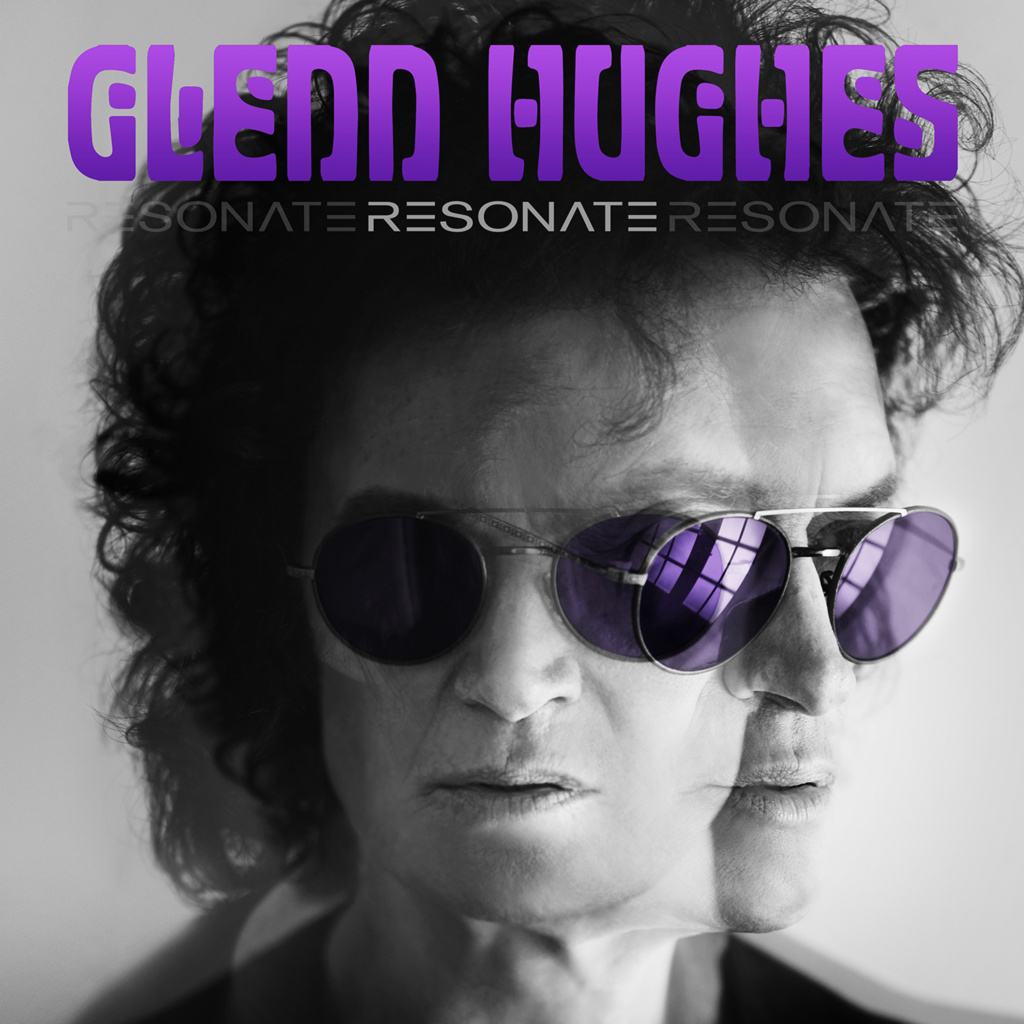
Art is a way for the one who creates it, someone who is in tune with the passions and pitfalls of their life, to process the intense, often agonizingly conflicting emotions that confront all of us in a way that is cathartic, and for which we – the audience – can identify with.
For someone whose artistic instrumentation is as finely attuned to his heart and soul as Rock and Roll Hall of Famer Glenn Hughes is, music is a vehicle by which he helps to unburden himself of pain on one hand, while also proclaiming the blessings of life and love on the other. The former bassist/vocalist of Deep Purple has used his gift to help himself – and millions of his fans around the world – navigate through the complicated, roller-coaster ride of this thing called life.
This is abundantly true on his majestically raw, revelatory and deeply personal new solo album, Resonate, which is set to be released worldwide on Frontiers Music on Nov. 4.
“This album for me has been a joy because it’s a Glenn album from start to finish. It’s a Glenn written album. I wrote this album around the time I last talked to you, when I was recovering from my knee surgery and I was writing up until early May. I wanted to have the songs well and truly finished by the middle of May because I had scheduled studio time with my solo band in Denmark and I don’t like to go into the studio with lyrics not done. I like to live with lyrics a while before I commit them to record,” he said.
“And I didn’t go the R&B, Tamla Motown route. I went very dark in places. I do have a great love for black American music, but I leave that for my own listening pleasure. When people think of Glenn Hughes they go straight to the rock Glenn Hughes, and that’s who I am. I may enjoy other kinds of music and I may have dabbled in other kinds of music, but I am very focussed on the rock side of Glenn Hughes now. I can’t change who I am.
“But there is always going to be a groove. I come from an era in England of some great bass players. I was good friends with John Entwistle of The Who, Andy Fraser of Free and Chris Squire of Yes and these guys were so bass driven in their writing. And this album, for me, as you can imagine, is very bass driven. The bass is louder than ever before on any of my records. It was important to me to have a very bass heavy sounding album.”
The term ‘heavy’ which also happens to be the title of the album’s first single, features Hughes’ long-time friend Chad Smith of the Red Hot Chili Peppers on drums. It is an apt description of the overall tone and tenor of Resonate. It is a heavy rock album for sure – arguably the closest thing to metal he has done since his collaborations with Black Sabbath’s Tony Iommi in the mid-1990s.
But for folks of a certain vintage, ‘heavy’ is also a somewhat anachronistic term popularized during the so-called ‘hippie’ era of the late 1960s and early 1970s and refers to negative experiences, situations and emotions. This could be said to appropriately describe Hughes life experiences during the creation of the songs that appear on Resonate.
“I really am a hippie, man. I have lived in California for 43 years. I am a hippie at heart and I am also a regular dude. When I am offstage, I am pretty low key. I am not a party dude. You won’t see me at any Animal House-style parties. I am pretty level headed. And I take my songwriting professionally: I am an 8 to 5 songwriter. I get up in the morning and I write like it’s my job – because it is. My solo career means everything to me now,” he said.
“My heaviness isn’t so much the actual musical content of the compositions; maybe the heavy is actually the lyrical content of the album, because of what I was going through in the spring with the loss of my dad, being laid up after surgery. I guess I was unloading some emotional stuff for sure. And you can hear it on some songs where I am angry and I am pissed and this is the first time I have ever been that angry on a record.
“What you have to understand is when I step up to a microphone I don’t have any preconceived notions. I know that I am going to  be looking at my lyrics and just going with how I am feeling about it right there in the moment. I was actually questioning some of the things I was singing; especially my attitude, but I left it on there. I left the aggressiveness of the way I sang on at points on this album because it’s really how I was feeling at the time. And I think people want that authenticity. I didn’t want to cover any feelings up. It’s a very honest album for me. I find that I am becoming more comfortable in the various facets of my voice, including the turbo edgy voice that comes out a few times on this record. I am becoming more centred as a singer now.”
be looking at my lyrics and just going with how I am feeling about it right there in the moment. I was actually questioning some of the things I was singing; especially my attitude, but I left it on there. I left the aggressiveness of the way I sang on at points on this album because it’s really how I was feeling at the time. And I think people want that authenticity. I didn’t want to cover any feelings up. It’s a very honest album for me. I find that I am becoming more comfortable in the various facets of my voice, including the turbo edgy voice that comes out a few times on this record. I am becoming more centred as a singer now.”
But for every bit of darkness on the album there are many glowing, powerfully illuminating shafts of positivity, which is the opposite side of the same ‘hippie’ coin as Hughes is truly a walking embodiment of the peace and love philosophy. The song My Town sees Hughes reflecting back on the City of Angels – Los Angeles – where he has lived for the past 43 years since crossing the pond during the height of the success of his tenure with Deep Purple in the early 1970s. L.A. is both the bane and the boon of his existence – and as described in this poignant song, Hughes wouldn’t have it any other way.
“My Town can kind of mean something for everybody. I just feel really comfortable singing that song about where I live. Los Angeles is a make or break city. It’s a town that can kill you. Like New York, you have to be ready to live on the streets and be a part of the streets. But I have been living here most of my life and this is my town. You can hear there’s an edge and some aggression in my singing there too. That’s what L.A. does to you. I love L.A. and feel I am a part of L.A. and that the city is a part of me. When I play in Los Angeles, I get a great audience of people who know that I am from there, that I am one of them,” he explained.
“Although I was born in the Black Country in England, this is my home. Los Angeles damn near killed me and absolutely saved my life. I got sober here, but I almost died here. Every street corner in the city is a trigger for me because this is where I have been living most of my life and have so many memories. But yet I walk these streets of L.A. and I feel free and safe. I don’t feel like that in any other city in the world. This is my town. This is it. This is a place of freedom and love for me.”
Hughes writes and sings songs about real life – his own life – eschewing story songs and intricately contrived fantasy narratives that are common in hard rock and metal music.
“When I am writing and when I step up to the microphone in the studio I am actually acting. I am looking at the lyrics like an actor reading a script and working on my character for that moment. On songs like Landmine and others, I am in character. You can hear that the tone of voice on Landmine is totally different than the tone on any other part of the album. I really wanted it to have a swagger,” he said.
“And then Long Time Gone is more innocent sounding. I am very Californian on that song and then on God or Money I am very British, and sort of angry. I sing about human things. I don’t sing about fictional things. Other great singers from rock and metal bands can pull it off singing about witches and goblins and elves and stuff and you believe them and you want to believe them. But you would never believe me singing that because I don’t believe in that stuff. I sing about what goes on in the heart, what goes on in the mind and the soul of humans.”
God or Money from Resonate has Hughes unleashing the full force of his powerful voice, demonstrating why he is still considered to be one of the best hard rock singers on the plant. On this song, all the anger, frustration and incredulity he can muster is brought to bear – unfiltered and unequivocal.
“It’s about the choices that I and many others have made over our lives. I have been offered lots and lots of money to do things which would have been indifferent for me. I have choices to make every day: do I want to do this or do I want to do that? I have always put my art first. I have never made a quick buck. I am always thinking of longevity. That’s why in this song I am singing about not bowing down on the ground to the god of money,” Hughes explained.
“I don’t want to do things simply because of the greenback dollar. I just don’t do it. I want to make creative music that is deeply within me. For me to get all nostalgic, that will happen in 10 years from now. But in the interim I have so much more new music inside of me, it’s unbelievable. The music I have coming out of me is never ending, thank God, and I really appreciate that.”
Hughes has always possessed a profound sense of self-awareness and an understanding of his place in the world and he has always been a driven human being, overflowing with creative energy. On Aug. 21 of this year he turned 65, which is a time in life when most people look to detach from work, slow their lives down and relax. Hughes has never been busier as a performing musician, never been more prolific as a songwriter and recording artist and because of his, has never been happier and spiritually satiated.
 “Let’s talk about that for a moment. When I turned 50, I was in Las Vegas. I went there for business with my wife [Gabrielle] and we went out to a restaurant and I had a meltdown. I literally started to cry out of sheer panic and fear that I actually turned 50. I gracefully and gratefully turned 50, but I had a moment of thinking, it’s over – it’s all over. And then my wife calmly walked me out of the restaurant, put me to bed and I woke up the next day and I had this vision where I remembered all the good things that happened to people like Tina Turner in their last half century,” he said of his momentary existential crisis.
“Let’s talk about that for a moment. When I turned 50, I was in Las Vegas. I went there for business with my wife [Gabrielle] and we went out to a restaurant and I had a meltdown. I literally started to cry out of sheer panic and fear that I actually turned 50. I gracefully and gratefully turned 50, but I had a moment of thinking, it’s over – it’s all over. And then my wife calmly walked me out of the restaurant, put me to bed and I woke up the next day and I had this vision where I remembered all the good things that happened to people like Tina Turner in their last half century,” he said of his momentary existential crisis.
“Since then I haven’t had a meltdown about my age. I didn’t have one at 55, or 60 or 65. And that’s because, in general, people know who I am. They know I am in recovery from drugs and they know I have gone through major heart surgery, they have seen me recover from knee surgery [earlier this year]. I have done it all and I have survived everything. I know how to navigate around the internet and this modern world and I know how to deal with people.
“And you know as busy as I have been and as fulfilling as my career has been since I became sober in the early 1990s, it has only been the last six years since I have had a team behind me, that I really feel free and moving forward the way I should be. I think of long-time friends like Paul Rodgers [Free, Bad Company, The Firm] and others and how we’re blessed to still do what we do. And at our age, in our 60s and 70s, many of our friends are dying. I have lost seven or eight of my friends in the last year alone.
And it’s awful. But I am so grateful to tell you that I am so awed to still be here. I live my life from a place of profound gratitude. I have a large group of followers online and apparently my messages to them and my morning rambling that I do on the internet each day affects these people. They thank me for helping them get through another day. I am now not a man who lives with hate or lives with fear. I live in hope; I live in grace.”
A dynamic stage performer since his days with funk/rock band Trapeze in the early 1970s, Hughes tours relentlessly, averaging more than 100 shows a year. He will be touring with his solo band for much of the fall and into 2017. As well, he will be hunkering down for another intense and productive writing session with friend and blues guitar sensation Joe Bonamassa to craft more material for the forthcoming new Black Country Communion album. The rock/blues supergroup released a trio of critically-acclaimed studio albums and one live album from 2009 to 2012, alongside drummer Jason Bonham and keyboard whiz Derek Sherinian.
“Joe and I spent a week in my home a little less than a month ago and it was the first time that we had spent so much time together in my home just writing. We were at it for four days solid and we wrote eight songs. And we are going to get together on Oct. 15 and we’re going to work for two weeks and write more songs of Black Country Communion. And I can say this to you, Jim. We would have known by now if we were not going to go into the studio. Because, let’s be clear, if we didn’t have the material, I don’t think Joe and I would want to make a reunion album. We’re not doing it for the money. We’re doing it because Black Country Communion was and is such a great band. So after those first eight songs we kind of stepped back, listened to them and nodded to each other and said, ‘yeah, we’ve got something really special here,’” he said.
“So we’re going to continue in a couple of weeks and then get together with producer Kevin Shirley [Iron Maiden, Journey, Rush] to start hashing things out. The good news for Black Country Communion fans is there is going to be a new record coming in May of 2017. And we’re all excited. Because Joe and I live in the same city, and because we had a window of time where we both weren’t working, we decided to start the ball rolling. I am sure Jason [Bonham] will come in with something, as well as Derek [Sherinian] when we get into the studio to start recording.
“We are trying to set a high bar here. We are really trying to make this fourth studio album the best record out of all of them. We’re trying to give the audience a grand and glorious rock opus. We know what we want, when know what we’re missing and we know what we’re going for. And we’re really going for it. We’re going to nail this thing. It’s going to be very raw and push/pull, light and shade. It’s all the drama of what a rock record should be.”
For more information on Hughes and Resonate, visit http://www.glennhughes.com/resonate.
* Jim Barber is a veteran award-winning journalist and author based in Napanee, ON, who has been writing about music and musicians for a quarter of a century. Besides his journalistic endeavours, he now works as a communications and marketing specialist. Contact him at jimbarberwritingservices@gmail.com
*** Read our previous interview with Glenn Hughes here: http://www.musiclifemagazine.net/glenn-hughes-working-on-new-solo-album-and-reunites-with-black-country-communion-pals.

SHARE THIS POST:
